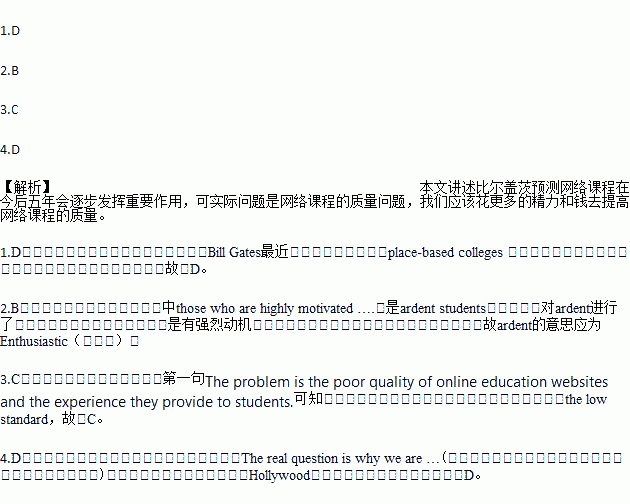题目内容
Bill Gates recently has predicted that online learning will make place-based colleges less significant, and five years from now, students will be able to find the best lectures in the world online. I applaud Mr. Gates. But what’s taking us so long?
As early as 1997, MIT(麻省理工) decided to post videos of all university lectures online, for free, for all people. But today, how many students have you met who mastered advanced mathematics or nuclear physics from an MIT online video? Unfortunately, the answer is not many. The problem is the poor quality of online education websites and the experience they provide to students. Those who go to the MIT website and watch courses online are surely very smart people, but it’s not like playing a video game such as World of Warcraft. Only the most ardent students, those who are highly motivated, will devote themselves to studying these boring online videos.
The real question is why we aren’t spending more to develop better online education platforms. Where is the Avatar of education? Think about this. The market for Hollywood films per year is worth around 30 billion USD. Education in the world is a trillion-dollar-a-year market, hundreds of times bigger than Hollywood movies. Yet the most expensive digital learning system ever built cost well under 100 million dollars.
Bill Gates’ prediction is going to happen. There is no doubt about it. But it will only happen when we create high level educational content and experiences that engage and excite more than has ever been possible in the real world.
1.What has Bill Gates forecast about online learning?
A. It will concentrate on physics lectures
B. It will completely replace real universities
C. It will help to make universities more successful
D. It will play an increasingly important role in education
2.What does the underlined word “ardent” in Paragraph 3 mean?
A. Creative B. Enthusiastic
C. Well-behaved D. Experienced
3.According to the author, what is holding back the popularity of online learning?
A. The lack of lectures available online
B. The high cost of access to the websites
C. The low standard of educational websites
D. The competition with online computer games
4.Why does the author mention Hollywood?
A. To show that Hollywood produces many successful movies
B. To prove that education is more profitable than entertainment
C. To argue that movie directors should produce educational content
D. To urge that more money be spent developing educational websites


 B.
B. 
 D.
D. 